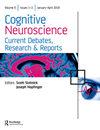The hard problem makes the easy problems hard - a reply to Doerig et al.
IF 2
4区 医学
Q3 NEUROSCIENCES
Cognitive Neuroscience
Pub Date : 2021-01-01
Epub Date: 2020-11-11
DOI:10.1080/17588928.2020.1838469
引用次数: 4
Abstract
In their paper Doerig et al. argue that we should put the hard problem aside and focus on empirical data to solve the 'easy' problems of consciousness - finding the neural and functional correlates of consciousness. In other words 'shut up and measure'. This has worked well with other thorny issues, such as explaining life, so why not adopt this approach here? We argue that despite the popularity of this view it is not feasible. In order to collect any consciousness data one needs to take an implicit or explicit stance on the hard problem.
困难的问题使简单的问题变得困难——这是对Doerig等人的回答。
在他们的论文中,Doerig等人认为,我们应该把困难的问题放在一边,专注于经验数据来解决意识的“容易”问题——找到意识的神经和功能关联。换句话说就是“闭嘴测量”。这在其他棘手的问题上很有效,比如解释生命,那么为什么不在这里采用这种方法呢?我们认为,尽管这种观点很流行,但它是不可行的。为了收集意识数据,人们需要对这个难题采取明确或含蓄的立场。
本文章由计算机程序翻译,如有差异,请以英文原文为准。
求助全文
约1分钟内获得全文
求助全文
来源期刊

Cognitive Neuroscience
NEUROSCIENCES-
CiteScore
3.60
自引率
0.00%
发文量
27
审稿时长
>12 weeks
期刊介绍:
Cognitive Neuroscience publishes high quality discussion papers and empirical papers on any topic in the field of cognitive neuroscience including perception, attention, memory, language, action, social cognition, and executive function. The journal covers findings based on a variety of techniques such as fMRI, ERPs, MEG, TMS, and focal lesion studies. Contributions that employ or discuss multiple techniques to shed light on the spatial-temporal brain mechanisms underlying a cognitive process are encouraged.
 求助内容:
求助内容: 应助结果提醒方式:
应助结果提醒方式:


